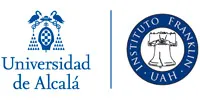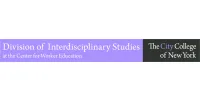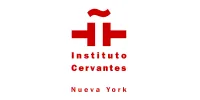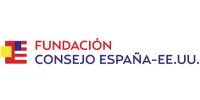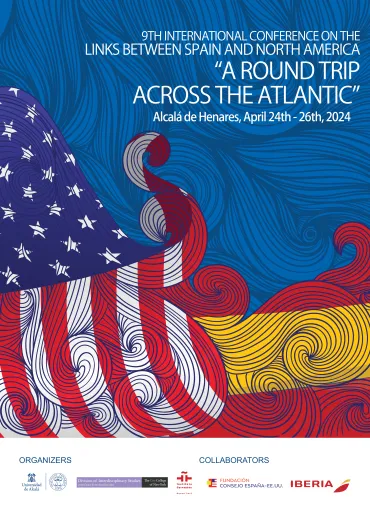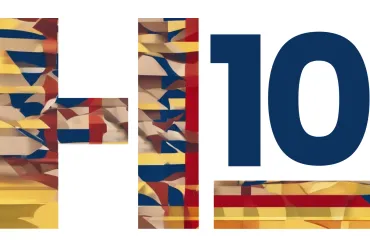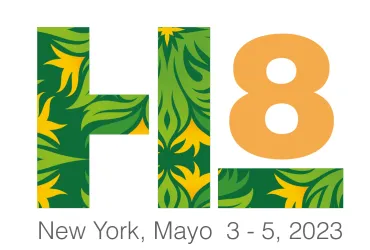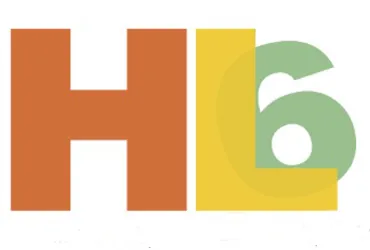9th International Conference on the Links between Spain and North America
“A Round Trip Across the Atlantic”
The year 2023 marked 510 years since the arrival of Ponce de León to the coasts of Florida, beginning a relationship between Spain and the lands of North America that persists until today. At the beginning of the 16th century, the islands of the Antilles had become the point of arrival and departure of a complex system of fleets between the peninsula and the Caribbean in which the island of Santo Domingo, Cuba and Puerto Rico also marked the beginning of explorations towards the mainland. It was in that same expedition of 1513 that Antonio de Alaminos recorded the first description of the Gulf Stream, scientifically establishing what for the following three hundred years became the tornaviaje or route back from the American coasts to the European continent, sailed by the Spanish treasure fleet on a round trip in which ideas, merchandises/ goods/products/wares, men and women from Europe and America circulated cyclically across the Atlantic Ocean–a bridge, not an abyss–connecting two worlds that were building each other. Let the metaphor of the Atlantic bridge be used to discuss the round trip paths which, from the Iberian Peninsula to North America and back, two societies with common roots and a prosperous future have crossed.
The IX International Conference on the Historical Links between Spain and North America will deal with the influences and connections across the Atlantic, both in the past and the present from a political, social, economic and cultural point of view, as well as in relation to the current challenges of the international community related to the new geostrategic order imposed by the war in Ukraine, the emergency of climate change, or the new Asia-Pacific relations. As main points of this annual meeting, these issues will be discussed from an Atlantic perspective and, more specifically, from the relationship of Spain and North America and the Caribbean Islands with the goal of proposing new answers to new problems, without forgetting the roots of a more than 500 -year-relationship with the American continent.
Topics:
- The Spanish presence in North America and the Caribbean Islands, especially Santo Domingo.
- Cultural and educational exchange
- Marca España: connections and business networks between Spain and North America
- Inmigration and migratory movements
- Social movements on both sides of the Atlantic
- Climate change
- Transatlantic relations
- Artistic expressions along the Atlantic
- Dominican Studies
Instituto Franklin de la Universidad de Alcalá, the Division of Interdisciplinary Studies of the City College of New York, and the Instituto Cervantes of New York come together for the ninth consecutive year in the organization of this conference through this call for proposals in different disciplines and areas of study with a special emphasis on interdisciplinary approaches to the links between Spain and North America.
- Call for Papers: September 2023
- Deadline for proposals: December 20th 2023
- Deadline extension for proposals: January 31st 2024
- Publication of the provisional program: February 8th 2024
- Reduced payment fees: from February 8th 2024 until March 11th 2024
- Regular payment fees: from March 12th 2024 until April 4th 2024
- Publication of definitive program: April 10th 2024
- Carlos Aguasaco (CCNY-CUNY)
- Richard Bueno Hudson (Instituto Cervantes NY)
- Esperanza Cerdá (Instituto Franklin-UAH)
- Cristina Crespo Palomares (Universidad de Alcalá)
- Julio Cañero (Instituto Franklin-UAH)
- Lorenzo Delgado Gómez-Escalonilla (CSIC)
- José Manuel Estévez-Saa (Universidade da Coruña)
- José Santiago Fernández Vázquez (Universidad de Alcalá)
- Jose Antonio Gurpegui (Instituto Franklin-UAH)
- Montserrat Huguet Santos (UC3M)
- David Jeruzalmi (CCNY-CUNY)
- Juan Carlos Mercado (CCNY-CUNY)
- Susanna Rosenbaum (CCNY-CUNY)
- Danielle Zach (CCNY-CUNY)
- Esperanza Cerdá Redondo (Instituto Franklin-UAH)
- Carlos Herrero Martínez (Instituto Franklin-UAH)
- Ana Lariño Ares (Instituto Franklin-UAH)
- Laura Rey Carretero (Instituto Franklin-UAH)
- Cristina Sánchez Pacios (Instituto Franklin-UAH)
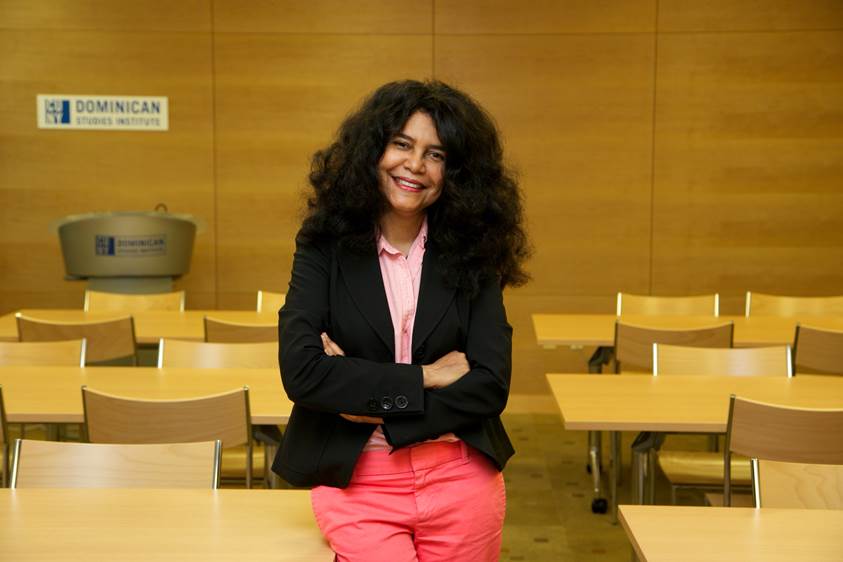
Ramona Hernández - City College of New York
Dr. Ramona Hernández is Professor of Sociology at the City College of New York, City University of New York (CUNY) and Director of the CUNY Dominican Studies Institute (CUNY DSI). Dr. Hernández is also affiliated with the Doctoral faculties of the Department of Sociology and the Master of International Studies, both at the CUNY Graduate Center.
Dr. Hernández's research areas include the mobility of Latin American and Caribbean workers, the socioeconomic conditions of Dominicans in the United States, and the restructuring of the global economy and its effects on the working class. A renowned public speaker, Dr. Hernández has lectured at numerous universities and community venues in the US, Europe, Latin America and the Caribbean.
She is the author, co-author, and co-editor of numerous books, book chapters, and academic journal articles. Among his published books is The Mobility of Workers Under Advanced Capitalism: Dominican Migration to the United States (Columbia University Press), an innovative book on the socioeconomic conditions of Dominicans in the US, and awarded by the prestigious North American academic journal Choice, with the award “Outstanding Academic Title.” She is also editor of Classic Knowledge in Dominican Studies (Routledge), the first series of classic books on Dominican studies in the U.S. The Dominican Republic and the Foreign Press: May 1961-September 1963 (From the Disappearance of Trujillo to Juan Bosch) (Pedro Henríquez Ureña National Library; with Sully Saneaux); From the Shore: Towards a Nationality Without Evictions (La Trinitaria; with Silvio Torres Saillant); and The American Dominicans (Greenwood Press; with Silvio Torres Saillant). Currently, Dr. Hernández is working on two books, one about Dominican immigrants who came to the US through the famous port of Ellis Island between 1892 and 1924, under contract with Columbia University Press, and another about the emergence of the Dominican community in the US co-authored with Gregory Morton, under contract with Lived Places Publishing.
Under the leadership of Dr. Hernández, CUNY DSI has become a research institute that enjoys undisputed leadership in the academic field, both nationally and internationally. Her reputation has been fostered in the production of pioneering academic studies in the areas of Dominican and Latin Studies. Under his charge, the Institute's library was established in a modern facility, and has the only library staff specialized in Dominican Studies in the entire US. Also, the first Dominican Archive outside the Dominican Republic was inaugurated, which contains the largest collection of Dominican colonial documents in the US with approximately 110,000 pages of manuscripts on 16th century Hispaniola (today's Dominican Republic and Republic of Haiti). The Dominican Archive is also the only repository dedicated exclusively to preserving the papers that document the experience and actions of the Dominican people in the United States.
The Institute has received numerous prestigious grants in the U.S., including the Aaron David, Andrew W. Mellon, Rockefeller Foundations, the National Endowment for the Humanities, the National Science Endowment, as well as the various spheres CUNY DSI is recognized for its innovative projects including several online platforms, such as The Spanish Paleography Digital Teaching and Learning Tool; A history of Dominican music in the United States; The First Blacks in the Americas; and Fighting for Democracy: Dominican Veterans of World War II.
Dr. Hernández is a member of the board of advisors of several publishing projects and organizations, among which are: Editorial Board of the book series Latinos/as in the Americas; Latino/a Sociology; Latinos: Exploring Diversity and Change; the academic journals Latino Studies and Camino Real: studies of North American Hispanicities; the Sociological Initiative Foundation and the Global Institute of Higher Studies in Social Sciences in the Dominican Republic.
Dr. Hernández has received numerous awards for her work, including a United States Congressional Medal. Her work is also celebrated in the Dominican Republic, where she received the highest distinction granted by the Government of that country, The Order of Merit of Duarte, Sánchez y Mella.

Francisco Moreno Fernández - University of Heidelberg and Universidad de Alcalá
Francisco Moreno Fernández is Alexander von Humboldt Professor at the University of Heidelberg and Honorary Research Professor at Universidad de Alcalá. He has been Academic Director of the Instituto Cervantes , where he has also directed the centers in São Paulo, Chicago, and Harvard, the latter as Executive Director of the Observatory of the Spanish Language and Hispanic Cultures in the United States. He is currently Director of the Global Spanish Observatory. He has been a Visiting Scholar at the universities of London, New York, Quebec, and Tokyo, and a visiting professor at universities in Europe, Latin America and the United States. He is a full academic of the Academia Europaea and the North American Academy of the Spanish Language (ANLE) and corresponding member of the RAE, and the Cuban, Chilean and Mexican academies of the Language. His publications include: Social history of the languages of Spain (2005), Principles of Sociolinguistics and Sociology of Language (2008), The Spanish language in its geography (2016), The wonderful history of Spanish (2015), Atlas of the language Spanish in the world (with J. Otero Roth, 2016) and Tras Babel (2018). In 2003 he received the award for the best series of articles in large-circulation newspapers from the National Association of Hispanic Publications of the United States, and in 2019 the XV Don Quijote Prize for Journalism.

Carlos Canales - Lawyer, writer, and expert in Modern History and Spanish Folklore
Carlos Canales Torres (Madrid, 1963) is a lawyer and writer. A researcher of folklore and traditions, he is the author, together with Jesús Callejo, of Duendes (1994), the first work in the trilogy about the "magical beings of Spain" and Seres y Lugares en los que usted no cree (1995). As a researcher of the history of Spain, he has been director of the history magazines Ristre and Ristre Napoleónico and is the author of dozens of historical articles and essays. In 2011 he was awarded the IX Algaba Prize for Biography, Memories and Historical Research—on a shared basis—and between 2012 and 2106 he was in charge of the collection Trazos de la historia. He has been a member of the program La Rosa de los Vientos, on Onda Cero, co-author of the book Enigma: de las pirámides de Egipto al asesinato de Kennedy and is part of the team of the program La escóbula de la brújula, on the SER chain. Canales and Del Rey participate in the North American history project Edge & Cleaver and together they have published fifty titles referring to the history of Spain.
Registration fee includes: admission to sessions and plenary conferences, conference material, welcome coffee breaks, institutional cocktail and participation or attendance certificates.
IMPORTANT: if you need an invoice or receipt, contact cristina.sanchez@institutofranklin.net BEFORE registration and payment.
| Reduced fee, from February 8th until March 11th | Fee |
|---|---|
| General Speaker | 100 € |
| Young Researcher Speaker * | 80€ |
| Attendees | 60 € |
| Undergraduate Students** | 30 € |
| Instituto Franklin-UAH Students | 0 € |
| Normal fee, from March 12th until April 4th | Fee |
|---|---|
| General Speaker | 140 € |
| Young Researcher Speaker * | 100 € |
| Attendees | 60 € |
| Undergraduate Students** | 30 € |
| Instituto Franklin-UAH Students | 0 € |
*A proof of registration must be attached in the Document field.
**EA proof of registration must be attached in the Document field
Cancellation Policy
Until March 12th: 80% refund
Until April 4th: 50% refund
From April 4th: no refund
- Presentations should last approximately 20 minutes, leaving time for questions or debate.
- The spaces where the panels will take place have a computer, projector, screen and WiFi connection.
- It is recommended to use a USB or flash drive for the presentations of each paper, preferably in PPT or PDF format.
